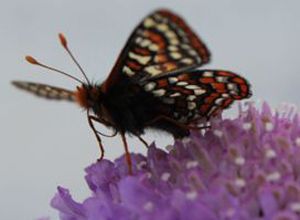By Paul Sheldon and Burt Klein
After hearing for years about Washington inmates raising endangered frogs, butterflies, grasses and mosses, we were excited to finally be able to send a representative to visit Mission Creek Correctional Center for Women last Thursday to see first-hand and meet the people involved.

In 2004, the Washington State Department of Corrections (DOC) and The Evergreen State College began a partnership at the Cedar Creek Corrections Center. That Partnership led to today’s Sustainability in Prisons Project (SPP).
Pilot activities from 2004-07 helped the prison reduce its operating costs and environmental impact while fostering engagement with nature and conversation among the entire prison community.
The mission behind SPP focuses on three areas:
• Green-collar education and training
• Sustainable operations of prisons
• Scientific research and conservation
With funding from the National Science Foundation, SPP hosted the first national symposium on scientifically-based, sustainability-oriented research in prisons, at the beautiful campus of The Evergreen State College in September. Conference activities included tours of scientific projects and sustainable operations at three prisons in Western Washington.
Our representative was not disappointed.
After an hour’s van ride, the group of nine pre-approved visitors was escorted into the 300-bed facility and introduced to the compost piles, recycling bins, garden beds, water-recycling systems, butterfly-propagation greenhouse and the women who maintain them.
One of the most lasting impressions was made by an aspiring scientist in the butterfly greenhouse. In response to a question about what she prefers, when variously referred to as ‘inmate,’ ‘offender,’ or ‘scientist,’ she shared this story:
“I definitely prefer scientist. And it’s not just that in prison I have found work that I love after 25 years of hating my job as an office manager. It’s more about the way people treat us. A little while ago, I was attending church here, and a gnat was buzzing around my head.
“Without thinking, I clapped my hands beside my ear, to get rid of the gnat. The people beside me cried out to stop me: ‘You can’t do that,’ they said, ‘you’re one of the Butterfly Girls.’”
Achievements over the years
In early 2009, SPP partnered with the Washington Department of Fish and Wildlife to rear endangered Oregon spotted frogs. Since the beginning, two inmates have been employed as ecological research assistants inside the prison.

In 2011, another facility tailored to breed and rare endangered Taylor’s checkerspot butterflies was contracted and built
at Mission Creek Corrections Center for Women. Evergreen graduate students associated with the captive breeding of endangered butterflies project get training from the Oregon Zoo endangered butterfly lab, and in turn guide and teach the staff of 3-4 inmates.
SPP’s current activities focus on prisons at Cedar Creek, Stafford Creek, Mission Creek Corrections Center for Women and the Washington Corrections Center for Women. These facilities represent a broad spectrum of population size, gender, security level and infrastructure, which maximizes the extensibility of this project to other locations.
For more information, check out the SPP website.
Paul Sheldon is a Senior Advisor for Natural Capitalism Solutions and a founding member of the American Correctional Association’s Clean and Green committee.
Burt Klein is the President of Portion Pac Chemical Corporation, manufacturers of the CorrectPac line of environmentally-responsible cleaning products.

